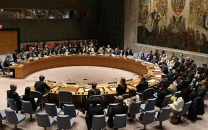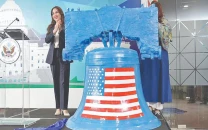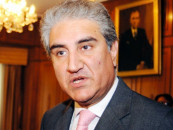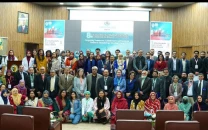Bringing out a newspaper
A new generation of Pakistanis will be produced by this newspaper. From their ranks might emerge another Zeno.

Bringing out a newspaper
I do not mean best just in the English language, or in South Asia. I mean among the best anywhere in the world. Indian readers have never had access to anybody of the erudition of Safdar 'Zeno' Mir, of the writing ability of Khalid Hasan, or of the wisdom of Khaled Ahmed. Papers in India are light, and lightweight. On April 7, The Hindu, India’s most venerable newspaper, shared its front page of a report announcing the killing of 74 Indian policemen with three stories on the legal status of Shoaib Malik's marriage.
Such frivolity might have been an exception for The Hindu, but it's a rule for most other papers. What explains India’s obsession with the light and fluffy? The problem of the Indian newspaper is a little strange: it has a surplus of readers. Unlike the newspapers of Pakistan, Bangladesh and Sri Lanka, the ones in India cost two rupees on average for anywhere between 24 to 30 pages. They are the cheapest newspapers in the world and it's not uncommon for them to have a million readers. Because the average newspaper costs eight rupees to produce, India's newspapers rely entirely on advertising not just for profit but also to break even. Advertising, of course, only comes to those with the most readers. In this madness of collecting readers, journalism has become entertainment.
Quality newspapers are edited at least partly in defiance of popular taste.
That's not possible in India but it is in Pakistan. For decades, Pakistan's citizen has depended on journalists to fight dictatorships. ‘Tribune’ was the name given to Roman officials elected to protect the interest of the ordinary citizen, and in that sense this newspaper is particularly well named. I can assure you that its writers have not been asked to focus only on the length of tennis stars' skirts.
I was part of a newspaper launch many years ago, when The Asian Age was published. It was enormous fun for a group of young men and women doing the first job of their lives, especially because the editor, M J Akbar, was a very charismatic man. The Asian Age was brought out by Akbar's charm, the sweat of his young crew and, because it was incompetently managed, the grace of God. Without luck it wouldn't have come out at all.
One day, we finished producing the pages only to be told at midnight that there was no money to buy newsprint and the paper would not be published that night. But that was fine and soon forgotten, because the great thing about a daily newspaper is that you can always start afresh the next morning. Later, also by a stroke of luck, I became editor myself. That was the best job I have ever done and it was fabulous to meet and talk to people one had only heard about. I have never been as afraid in my life as I was one afternoon when my secretary rang to say: "Mr Dilip Kumar is on the line". Dilip Kumar is the only man my father recognised as an actor, and my instinct was to hide under the table.
It wasn't me personally he wished to speak to but the person occupying the position of editor. In his beautiful Urdu he explained that a defaulting company that listed him as director wasn't really his.I said we would publish nothing without verification. And so ended what was really a small matter (but it gave me a lifetime of boasting: "Hello, dad? Dilip Kumar phoned and called me Patel saab. No, really").
In Europe and America they say the newspaper is dying. But that is not to say the written word is dying.
It is mankind's most powerful tool and it will always remain that. Formal communication makes humans civilised, and the birth of a newspaper is as beautiful and significant as that of a child. The editors and columnists of The Express Tribune will be recognised and made famous because their names are published. But the ones who will remember the excitement of its launch and learn the craft to carry it on to another newspaper a couple of decades from now are the paper's trainees and interns. I know what they feel this week. A new generation of Pakistanis will be produced by this newspaper — the group of young women and men who are helping bring these pages out, and another, larger, group that is reading them. From their ranks might emerge another Zeno. What a good thing that will be for Pakistan, and for all of us anywhere in the world who like to read a good newspaper.



















COMMENTS
Comments are moderated and generally will be posted if they are on-topic and not abusive.
For more information, please see our Comments FAQ